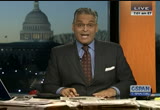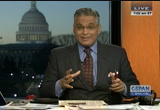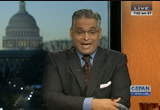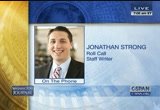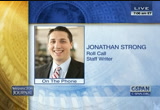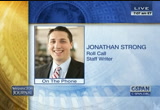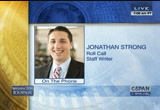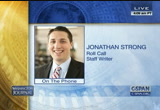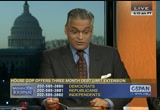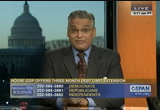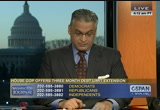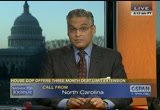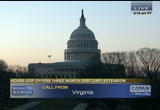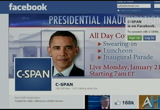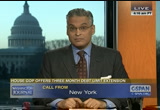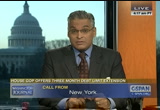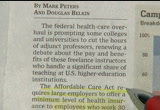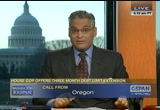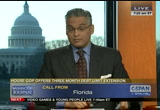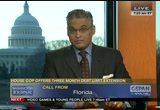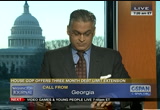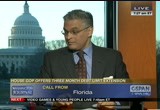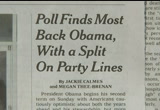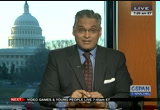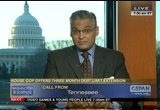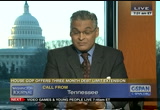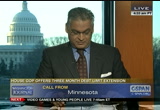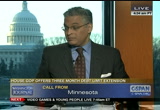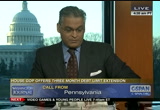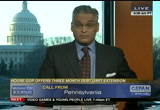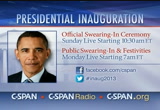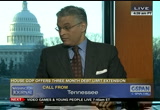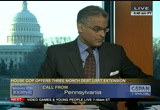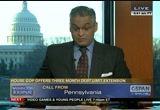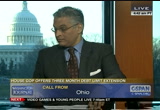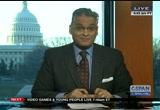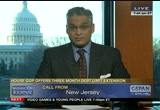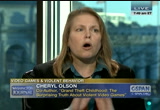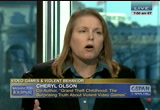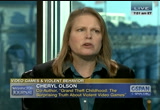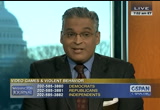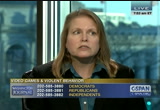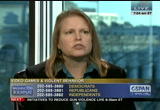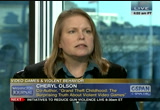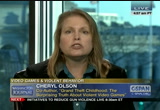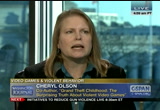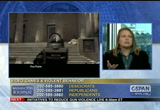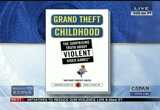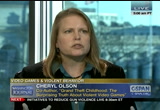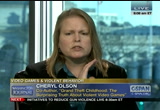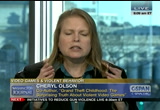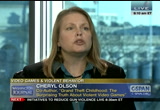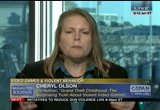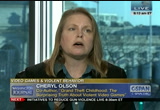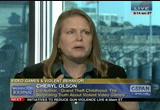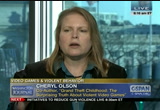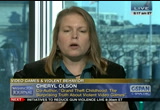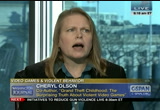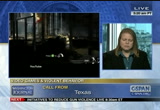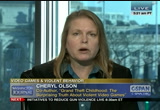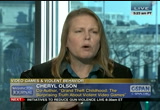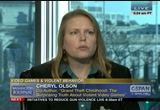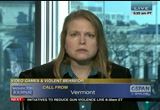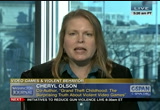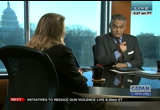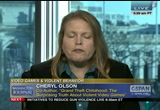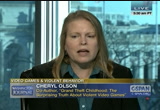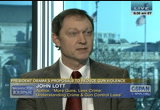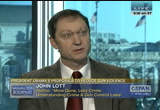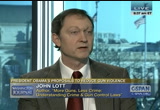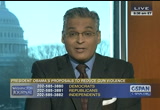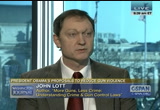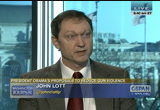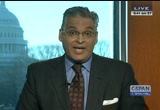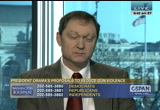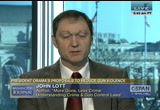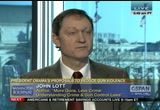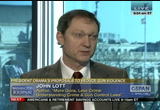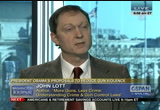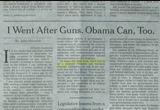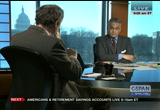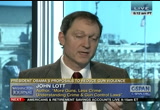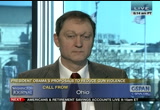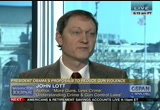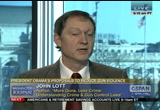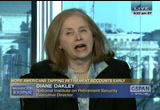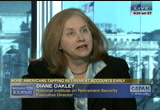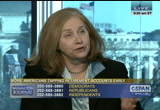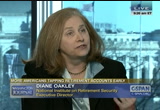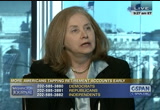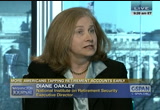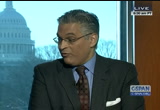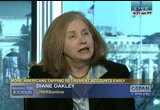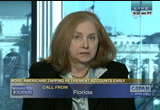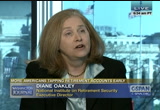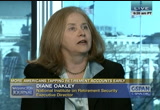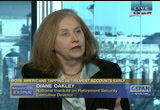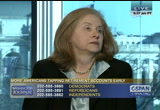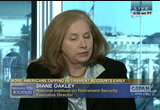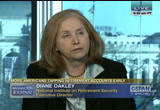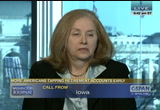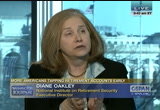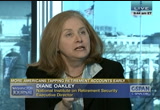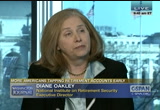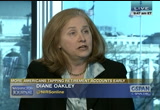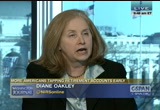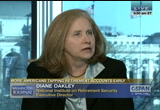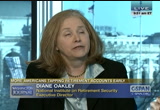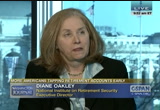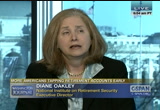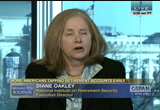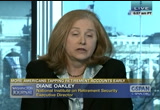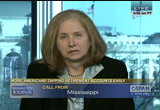tv Washington Journal CSPAN January 19, 2013 7:00am-10:00am EST
7:00 am
oakley, executive director of the national institute on retirement security on using retirementization accounts for non-retirement purposes and what that could mean for their later years. "washington journal" is next. [captions copyright national cable satellite corp. 2013] [captioning performed by national captioning institute] host: the capitol as it will be busy as thousands of people are expected to come for the swearing in of barack obama. his official swearing in will take place tomorrow at noon and you can watch them as part of c-span's coverage of the presidential inauguration. tune into our network tomorrow and monday for those events. you can go to c-span.org where we have laid out all the coverage and information on our website as part of the
7:01 am
inauguration coverage. speaking of congress, republicans at the house retreat this weekend have decided upon a plan they will vote upon next week to extend the debt limit by three months with hopes of using the federal budget as a way of tackling spending. what do you think of that strategy? you can call us at (202)585-3880 for democrats and (202)585-3881 for republicans. (202) 628-0205 for independents. send us a tweet at twitter.com/cspanwj you can send us comments on our facebook page and our email at journal@c-span.org. from the baltimore sun a story about the weekend retreat and a detail about the plan. writing debt limit vote set. here's what they write --
7:02 am
host: attending the retreat and writing a story about it, jonathan strong from roll call. he is their staff writer. jon, can you give us a little bit of the thinking by house leadership as to how they came up with this as a plan? >> good morning. i'm happy to explain it. one of the parts of this plan that's been a little misconstrued, it's not exactly
7:03 am
a quid pro quo that if the senate promises to do the budget then we'll raise the debt ceiling for three months. what this bill will actually do is set a provision that if the senate does not pass that budget in three months then their pay checks would be withheld, so that's the enforcement mechanism. it actually doesn't require any promise that the senate do its budget. there's conceiveably still the thought that they could not do the budget and not get paid. host: so then the house would respond in kind? tell us a little bit then why use this as a mechanism? >> the strategy here is they are trying to go on offense again, because they had a brutal holiday stretch of sort of failed negotiating ploys and
7:04 am
in-fighting and they are trying to turn the tables so people will talk about why went to democrats cut spending? one way they can do that is by talking about the fact that the senate hasn't passed a budget in four years. it's uplimited value there's a conventional wisdom that it's not that important but when the people in the country hear that the senate hasn't passed a budget which sounds like a basic failure of their duty and it's an effective talking point the republicans think. host: we have photos of speaker boehner in the papers. did he come up with this? who was the driver of the details of this plan? >> i have been trying to track down the exactor begin. there seem to be it shall the exact orie gin.
7:05 am
one was the democrat from the south who proposed this a year ago and there was some democratic sponsors to this idea. but what happened at the retreat is it kind of gained some steam, and on the morning of the decision to put this plan out, boehner and cantor and mccarthy met with a group of top influential conserves who gave their blessing to this deal, and that is how it was able to get in place to be announced before people quite expected it. the day before on thursday people were saying no major announcement was going to come out of this. then the next day these conservatives signed on to this. then boom, you had a deal, so to speak. host: what about paul ryan? stories coming out about his being quieter in the
7:06 am
background, especially since the election. did he have any say in this or shaping of the policy? >> yes. paul ryan since he's come back to congress from the presidential trail has avoided taking questions and kind of kept his head down. but at this retreat he played a very important role in a couple ways. first of all, he was very active in leading discussions with the republicans when they were trying to decide what their strategy was, and he also came out and talked to reporters and kind of floated this idea of the short-term debt ceiling increase, and he was part of a group of five conservatives who blessed this deal on friday morning. jeb hencer ling of texas and steve of louisiana and jordan of ohio and ryan. so it remains to be seen whether that will be kind of a
7:07 am
center of power going forward. host: as far as those five signing on to this deal, what's been talking about the members, especially on the republican side and -- will all of them go along with this? >> it's going to be tough for them, because they have to get 218 votes. the democrats have already signaled they are not going to provide any votes for this on their side of the aisle. i would say that would be so difficult for them to do when you have, you know, the last four chairman of the republicans senate committee saying they are onboard with this, it doesn't give, i mean, it seems it would be difficult for so. more ranking file members to say this is not good enough. i mean, it seems the right ones were onboard with this in a pretty significant way. >> i guess the timetables of
7:08 am
this, where do we see next week and where do we go from there? >> what we're going to see is a vote in the house. they are planning to do a vote in the house on this bill which has yet to be written, but it will set this principal of no budget/no pay. because they say you can't vary the compensation of congress without an election in between. so they are going to have to work that out, write the bill, put it on the floor next week, and then next major question is will the senator harry reid feel the need to take this bill up? and his response initially yesterday, he didn't kind of rule it out right, i mean, he didn't say no right away, but he did suggest he was not ready to commit just yet.
7:09 am
so we will have to see what happens. host: the expected no pay on the senate side i guess a driver for them, is this something they would be overly concerned about? >> some who are independently wealthy, it probably wouldn't be a big deal. but the house cut its office budget and i think they cut their pay, and some of the house members on the democratic side complained very vigorously about this. there's a whole lot of different people that make up the congress, and some of them are in great shape financially, millionaires. and some of them are not so great. those are probably going to be the squeaky wheels when and if that were to happen. they may be the ones saying we have to do this budget because i need to pay my car payment and rent.
7:10 am
host: jonathan strong roll call staff writer. we appreciate your time. again, your thoughts on this proposal from house republicans on the federal budget. and the extension of the debt limit for three months with some conditions that you heard our guest talk about. here's how you can give your thoughts on it. if you want to give us a call, it's (202)585-3880 for democrats and (202)585-3881 for republicans and (202) 628-0205 for and (202) 628-0205 -- (202)585-3882 for independents. charles scott adding a thought here saying there's already too much uncertainty in our tax structure to be doing this again in three months adds to the uncertainty. there are other thoughts as well. twitter available to you, too.
7:11 am
stuart, you are up first. good morning. caller: this goes along with the war on weapons. what congress needs to talk about is the everyday city crime, the shootings among drug dealers, the prison industrial complex, what ron paul and ralph nader talk about. real solutions to the debt limit and taxation of illegal drugs, at least marijuana will reduce the deficit, increase revenue, increase jobs. decrease crime in half. host: so what do you think about the strategy from house republicans? what do you think specifically on this as a strategy? caller: i think it's just a big joke. without new revenue. they know. they don't care that we're going down the tubes.
7:12 am
they don't care about sese quest ration. now they are talking about the construction industry is going crazy. we need more cheap labor from third world countries. like that's going to help. host: ela is on our democrats line from charlotte, south carolina. you're on. what do you think about this proposal? caller: i think it's crazy. because the president is not going to go for it. he has already said that he wants a clean debt ceiling bill. not three months that we have to go through the same thing again. he wants it for a whole year. so i don't understand why the republicans are doing this. they know they are not going to get it. they are not going to get this, so this is wasting precious time. they should do the debt ceiling for a whole year.
7:13 am
host: so ella, hole on we have a statement from the press secretary saying we are encouraged there are signs the republicans may back off on the insistens of holding our economy hostage to drathsically cut programs and democrats and republicans must pass a clean bill. caller: i heard this. and i heard jay cornyn say that. i know what he said. but they also said that they want a clean debt ceiling. not every three months you're going to have the same thing over again. they want it for a whole year. not this three-month extension. host: jeff this morning off twitter said this is a reasonable offer if the democrats do not accept it he adds nice play, g.o.p.
7:14 am
host: republican line? caller: yes, there are two features on this proposed legislative action. they have different levels of support for me. i do support the concept of withholding pay for not having a budget. i mean, not only should the federal government have a law regarding that but i think each individual state should enact a legislative negligence act that if you don't fulfill that responsibility of having a budget, you do not get paid and you get barred from running for future elective office. with regard to the debt ceiling, here we go again. the republican party, if it goes along with this deal in my opinion ought to change its name to the caveman party and boehner and mcconnell would be the cavemen in chief, because every time we come to this debt ceiling what do the republicans
7:15 am
do? they give in. and every amount of money that this country spends is showing it's unsustainable. we've got to reform them and get our budget in order and we've got to get our spending under control. host: lori who is one of the 65 people on facebook who has commented on this this morning says that this makes the seventh debt ceiling plays the obama's term while the democratically-controlled senate hasn't passed a budget. it seems silly -- logical to me at but he'll -- by the way, it gives an advertisement to our plans for inauguration weekend. all-day coverage. you can tune in on sunday and monday for activities monday all day starting at 7:00 a.m. and sunday for the official swearing in at the white house.
7:16 am
again, if you want more information on what we are planning and what we can give you as far as content and details, c-span.org is the place to go if you want to find out more. again, that's our facebook page you're looking at. as you're looking at that. new york, independent line good morning, this is mike. caller: good morning. thank you for having me on. i great will he appreciate it. i just wanted to as a side wanted to mention i am a physician of 22 years and i wanted to tell everybody that passing the health care bill on christmas eve we shouldn't forget about that without one republican vote after they were going to lose the midterm elections and everybody was fine with it except five or seven years from now when we have to pay that bill, nobody's going to know why the middle class' taxs are going up. but the debt ceiling, i think it's on both sides a very show boaty type of way is saying we
7:17 am
have to raise revenue and cut spending but people never want to talk about cutting spending. so the republicans i try to give them the benefit of the doubt but they always look like the bad guys and people love to hear i'm going to get this and that. i'm a small business owner and i don't like to think of myself as a small business owner but my employees are not going to get pay raises as quickly and i will not be as quick to give them benefits because they keep raising taxes on me. host: so the extension of the debt limit at least the proposeling put out by house republicans, what do you think of that as a strategy? caller: quell, -- well, again, i'm not too happy with it. i think we need real solutions. and we're not solving any problems by voting for three months. we need a budget as well. i'm not traying to beat up on
7:18 am
the republicans but without the senate having a budget people of america need to stop watching reality tv and start listening to what's going on in washington. and i'm not blaming it on the democrats. both sides are to blame but we need a budget and we need to stop spending money and we need to raise revenue. host: mentioned your work as a physician, there's word on the affordable health care act and what it does specifically for colleges. the headline "health law pinches colleges." they wrote it's prompting some colleges and universities are causing schools to cut the hours of someed a junk professors.
7:19 am
host: from portland, oregon, this is on our democrats line. good morning, fred. caller: good morning. thank you for having me on. i'd like to speak on behalf of every one of the citizens of the united states and on a very important non-renewable resource that we have. my suggestion is every robot that takes a job of an american citizen ought to pay the taxes that that person would be making if they had the job. host: got that. but back to our topic of this proposal by the house republicans to extend the debt limit for three months. what do you think of that? caller: well, it's important that we continue to pay our debts that we have incurred. we desperately need to get our spending in order, but that's
7:20 am
not something that we ought to hold them -- these talks and making sure that we pay our debts. host: thank you. from twitter, this is tomas henderson who actually just said, sounds like more kicking the can down the road to me. the editor of the "washington post" this morning used the story of this proposal to write an editorial on it saying this presents mr. obama with a choice. he can continue driving a hard bargain on political policy terms that would entail using the entitlements until the republicans capitulate with the regard to the sequester or and partial government shutdown or the president could act on his past promises to tacking entitlements and engage in good faith with republicans now so they have no further reason to exploit the quest station.
7:21 am
another writes if the house approves the stedges the next budget deadline would occur march 1 when the $1.2 trillion in automatic spending -- host: this comes as the larger proposal of what we have been talking about, headlines you may have seen already, headlines much like those in the baltimore sun that morning says house g.o.p. leaders and you heard our guest jonathan strong talk about the change in strategy to gain support. that's what we're talking about the remainder of our time. hunter, from fort lauderdale,
7:22 am
florida. our republican line. go right ahead. caller: good morning. i think what people are missing is that in a way the republicans are doing the american public a service. we go through these decisions -- i'm not sure what you call them, deadlines or whatever, and people are getting tired of it. so really what republicans have done is they have moved the debt ceilings bypassing the date for the se quest ration. and i think the republicans are doing us a favor, because if the sequestration is done in one way, the debt ceiling becomes a -- subject. the other thing people are missing is really the big
7:23 am
problem is that the republicans do not press the president and the democratic party to make the tough decisions that we have to make. we need a plan. we need a plan to get out of this debt problem that we have. and that plan begins with a budget. i don't understand why people have a problem with congress being forced to come up with a budget. they are required to do so by law and we really need that to solve the problems of this country. we need a plan and the plan begins with a budget. these people, you know, let's get together on this. and get behind the idea that we have to make the right decisions, the tough decisions and have a pran. host: any belief with this proposal that some type of meaningful dialogue will come about the several partiesal involved when it comes to budget and fiscal matters?
7:24 am
>> well, you know, that's the beauty of the no-pay idea. caller: because if you don't start talking, you're not going to get paid. so i think there's a little bit of brilliance in that idea, too. they just have to get together. the republicans had a retreat. maybe the republicans and democrats need to together have a retreat and just talk together instead of this forum and grandstanding that they do. host: hunter from florida, thanks for your participation. joseph ramirez off twitter says this -- g.o.p. go big. and the mortgage lending industry getting targeted described in the pages of the "wall street journal."
7:25 am
host: curtis is from hills -- heinzville, georgia independent line talking about this proposal from house republicans about the debt limit. go ahead. caller: good morning. thank you for taking my call. a couple points i want to make. you know, a budget is basically just a guideline for what you're going to spend. the problem is it's the spending. spending, spending, spending.
7:26 am
that's what's going on. we are spending way too much money. you can lay out the foundation of the budget of what you want to propose and do but it actually comes down to what the spending is. and this kicking the can down the road every three, four, five, six months has got to stop. it gives the markets no stability. and it just puts us on a foot hold to play these political gamesmanship up and down. host: so what's a better strategy in your opinion? caller: we have to cut spending. host: where? caller: i wish i could waive that magic wand. as the budget negotiations were going and the debt ceiling crisis was going on there were all these proposals, and the problem is you don't know who to believe when they come out of these meetings. the president says this and the house majority leader says this. speaker boehner says this. it's hard for any of them to
7:27 am
have any credibility, because all of them can sit in the same meeting but there's always a different take on what goes on. host: from facebook, it is a reasonable offer but should have an additional rule that during a period of non-al productivity the body must not be supported by outside interests and to do so would mean a real indictment and possible prison time. legislators are expected to pass laws which last through time and not quick fixes. quick, temporary reactionary law making is what got us into this in the first place. caller: first of all, i would like to let everyone know democrats have presented a budget each and every year that if you listen closely, none was passed. so it's a republican-controlled party. and they didn't pass any bill or budget that the democrats
7:28 am
presented. secondly, is i think this three-month deal is another way of holding people hostage in order to get what they want instead of what's practical for the country and the third thing i would like to say is it's becoming quite evident that what we need in this country is a way in which if our elected officials can't do what they are supposed to do, then we hold a special election and let the american people who they are supposed to represent anyway decide should we pay our bills or not. host: in the paper looking at the second term. this is jackie with this headline.
7:29 am
host: republicans offering a three-month extension on the debt ceiling limit. a vote scheduled or at least announced for next week. we're getting your thoughts on the idea of a holdup of the debt limit extension. talks about the budget. talks about spending. as you've heard about this morning. you can join us for the remaining 15 minutes so we have our caller on the republican line. caller: the guy from florida is
7:30 am
wrong the democrats control the senate and they are controlled and even the democrats wouldn't vote for a budget but what should be more important for c-span although the same company that owns nbc owns c-span so you're always carrying the water for the democrats. talk about what the g.o.p. said about the dire consequences of our future and how in 10 years we will have spent $11 trillion on well fare. there's only two entitlements, social security and medicare. that means you paid into it and you're entitled to it and everything else is well fare and the country is going to be destroyed by this company who spends, spends, spends and steve, the big democrat, the little celebration he and his evil twin had after the
7:31 am
election was obscene. host: i have to stop you only because steve is not here and not to defend himself but to your other charge about nbc owning us, we're an independent company. nobody owns us and you probably know that. but talking about the spending issue, entitlement is part of the conversation what should republicans be offering as far as that end? caller: i think what they are doing is right trying to get harry reid to do something. why should we pay them? the senate have done nothing if two years and are required by law to come up with a budget. so come up with it senate or go home. host: you think they are going to come up with something? caller: no. because they are cowardly. reid doesn't want him or the president to know what they are ip to because anybody with a lick of sense wouldn't vote for him again then.
7:32 am
host: on our republican line? caller: watching the news and call your program and comment because these people the only thing they need so just help in the -- cause nothing but pain for this country. the biggest problem that we really have to look at is they keep going after the president. the debt limit extension or gun control. these are very minor things that can be done domestically in this country. the biggest problem is overseas we have in benghazi and nigeria. these are all distractions and i think they are doing it deliberately to distract the president that something happen that they can blame him. i wish they could leave him alone. host: tom, minneapolis,
7:33 am
minnesota on the democrats line. caller: this is my first time on and you look so dapper. you are off of g.q.'s front page. host: my wife thanks you. caller: i'm a moderate to conservative democrat and social liberal and conservative , financially. and i just with my brother and conservative friends, we really wish the se quester had gone through -- that the sequester had gone through. i know it would be untold devastation to our government if we lost 7% or 8% of our programs there. a lot of programs would have been cut almost across the board and it wouldn't make any difference to the running of the interstate highways and hardly any difference from the defense and also just to get
7:34 am
some left side -- and we thought this would show everyone if the sequester went through that we could cut, and i believe if the sequester would have gone through, it would have cut about half of our current budget deficit on an annual basis and would have been remarkable, because i don't think it would have made a huge difference to anyone and i think people would think maybe we could cut as an experiment and set a tone for the rest of the world that the united states was serious in a different way about in a real way about our economy. and i'm amazed that people are so worried about retaining and 8%-9% max that means our government would have gone through and wouldn't have been a problem. people would not have seen any difference on a day-to-day basis. host: our previous caller mentioned algeria. there's a story out of the
7:35 am
guardian in london talking about one man's experience. says a scottish man held hostage spoke of his relief of being rescued. and -- host: he added the algerian army's assistance has been fantastic. the topic that the house g.o.p. offered an extension. on our republican line, stephen joins us. hello. caller: thank you for taking my call. first time on here. this is really everyone's fault from the president on down. this can be solved without even a tax increase.
7:36 am
as one of the things that they should do is down there is quit borrowing from other countries. they have been taking money out of social security for their own gains and never putting it back. we got to cut back on us and use social security for things. it seems like neither republicans or democrats or independents care, and i think sometimes the american people have their eyes closed, because this whole thing can be solved very easily. you have a budget at home. you have so much coming in. you know you can't go over that amount or you're going to be in trouble. i say this. if they push this thing down three months then three months later, eventually it's going to collapse and we're going to have a crash. social security, what they need to do is raise the retirement age to 70.
7:37 am
don't take any money off medicaid or medicare, because when that thing was first started, most people 65-70, now the average age is roughly 80 and a lot of people in light of pennsylvania in your county are a victim of working. some like it. some don't. but it seems they don't care. they pass the buck and yell and scream at each other but don't care. host: "the wall street journal" takes a look at the activity with some of the elements that will be in the president's speech as he speaks and over monday. aids say he will strike an optimistic tone and likely seeming more confrontational talk for the state of the union and --
7:38 am
host: it stays president will have to pitch his agenda as he did in the first term. host: again, c-span, the place to watch your inaugural activities starting with the official swearing in ceremony. our coverage starts at 6:30 and the swearing in scheduled to take place shortly before noon and our coverage will start at 7:00 a.m. places you can turn to, facebook.com/c-span. the hash tag on twitter and coverage on c-span, c-span
7:39 am
radio and c-span.org. i would encourage you to go to our website, too. you get video on demand and the visual blog page. that and much more on our virtual and our website and virtue wall presence. on the democrats line, hello? hier, you're on. caller: hello. this is a.j. i think that the congress should pass the bill. i think they should stop delaying. i think they should go ahead on and pass. we are in debt, and if you're in debt then you are supposed to pay your bills. the government is not supposed to shellac on their bills. if you owe a bill, you're supposed to pay it. host: so do you think the senate will come up with a hard
7:40 am
budget? caller: well, let's just do the bill first. host: well, that's part of the proposal from the house for some type of budget from the senate. caller: well that wasn't it before until -- that wasn't like that until the president said that he was not going to debate this debt crisis. and if they wanted to do that they should have done that before time. let's stop playing games. host: first from pennsylvania up next, republican line. hi. caller: good morning. host: morning. caller: i think they are all a bunch of young children playing in the school grounds bickering over who is going to get the ball first. the republicans try to act responsible and the democrats just spend like teenagers with a brand-new credit card. i think what we need to do as
7:41 am
american people is lay them all off because it would be cheaper for us to pay them unemployment. take the money out of washington. host: what about the specific proposal on its face? what do you think of it? caller: well, i don't like just making extensions. it's not permanent enough. but -- host: why not? they should just decide on something and go on from there? caller: yes. host: and the idea that the senate come up with a budget, what are your thoughts on that? caller: well, the senate can't seem to come up with anything lately. i don't think they have ever in modern times come up with a decent budget. host: that's bruce from pennsylvania. in "the new york times" this morning a story about the treasury department and chrysler or sorry, general motors.
7:42 am
it says the treasury department says friday it would begin selling off its 19% stake in general motors. host: from ohio, democrats line. good morning. caller: good morning. i'd like to know why they don't fix the social security and medicare and medicaid just by raising the limit on how much can come out of your paycheck. we, as poor persons, have to pay into social security for
7:43 am
every penny we earn and the rich don't have to pay in anymore. why don't they get an economist to show how much can be added if they raise the limit from $500,000 to $1 million and on up and if there's any extra in social security help medicare and medicaid. host: as far as your thoughts on the house republicans to ask ask the senate to come up with a budget, what do you think of that proposal? caller: the budget they ought to extend it and for a year not three months. host: why one year? caller: that would give them a lot of time to get their act together and get everything fixed. host: one more call on this topic? joe on the independent line. caller: yes. the problem that we have right now is that the democrats and the republicans alike have not done what the sequester and
7:44 am
elimination of the bush tax cuts were supposed to achieve. the bush tax cuts over the last 12 years have added over $5 trillion to our federal debt. the sequester was supposed to take everybody sitting down so you would have a balance between the cuts and revenue increases and we really didn't get that. so what happened is this last thank happened over the new year's holiday, we got a little bit of the tax increases that we were spodse to get. we got no tax cuts. we're kicking the can down the road, and unless these people really start to get serious about this, we are going to be talking about this for the whole next four years and the country is only going to get worse and basically that's it. both parties have either got to come to the table and they have got to make meaningful cuts and get meaningful revenue to get out of this problem. thank you. host: and that will be it as
7:45 am
far as calls for this segment. let me tell you what's coming up in the program. you have been watching the white house. this week president obama as part of his proposal on gun violence had a study on violent video games and cheryl olson the author of "grand theft childhood." later john lott will join us. he is the author of "more guns, less crime." he will be on to talk about the president's proposal to reduce gun violence. all throughout the district of columbia we have our c-span photographers out there taking in photos and event it's leading up to the inauguration. a national day of service is part of those plans set forth today. part of inaugural coverage. if you go to the capitol that's the tent where it will take place and you will have collects talking about giving back to your country in a
7:46 am
variety of ways and that's a little bit of what you would see if you come to washington, d.c. as a part of inaugural activities. "washington journal" will be back in just a moment. >> are you prepared to take the >> i barack hussein obama do solemnly swear. >> this weekend the 57th presidential inauguration as president obama begins his second term. sunday, the official swearing in ceremony at the white house live sunday shortly before noon eastern. coverage begins with your phone call and a look bath back at his 2009 inaugural address then monday the swearing in at noon eastern at the u.s. capitol and other festivities including the lunchen and inaugural parade. on c-span, c-span radio and c-span.org. and throughout the day join the conversation by phone and on
7:47 am
facebook and facebook.com/ c-span and on twitter. >> i barack hussein obama do solemnly swear. that i will execute the office of president to the united states faithfully. >> that i will execute -- >> faithfully the office of president of the united states. >> when chief justice john roberts administered the oath to barack obama on january 20 2009, there was a major problem. robert it's was supposed to say that i will faithfully execute the office of president of the united states. so then barack obama stops, paused, smiled, as if to say, come on, man, this is my big day. you got to get this right.
7:48 am
but unfortunately, he didn't get it right. so the very next night in the white house, they did it again. this time roberts used notes which he hadn't used the first time and they got it right. >> jim bendat walked through democracies big day. that book features president obama, congress and martin luther king jr., part of a three-day holiday weekend on c-span 2's book tv. >> "washington journal" continues. host: joining us now cheryl olson the co-author of a book "grand theft childhood: the surprising truth about violent video games." thanks for joining us. guest: my pleasure. host: part of the president's proposal on gun violence was to fund a study looking at video games. what do you think of that propose snl guest: i think it's good depending upon how it's done.
7:49 am
a lot of studies are out there but hardly any of it was design as an academic journal and we really need more research. host: specifically where? guest: first of all the concern that it might trigger some kids to hurt people or hurt property. we got a lock at the kids who have tried hurt people or property and see if their video game use is somewhat different. there's no studies on juvenile offenders and their media use. also kids with mental health problems and mental health has been related to school shootings, it's unlikely one kid is going to be influenced by a video game that way but we have seen no ranks between the violent behavior and video games but parents that don't know how the handle stuff, some children may express mental
7:50 am
health issues by substituting with gaming. so we should find out more about those kids and their media use. host: what is a commonly-held belief between the connection of violent video games and if people act out? and what did your research show when you studied this? >> the popular view is there must be a link. the vice president at the meeting ran for video games said up front from the research i've seen, i don't see a link between violent video games and real-life violence but the public thinks there's a link and that's really why you are here. i said in my research in 2004 at that time we didn't even know the basic of who is doing what with whom and why? and how long? i said seventh and eighth grade kids, because that's when they are able to get out away from their parents. so i did a large survey of
7:51 am
those kids and focus groups. and the main thing i found was playing a violent video game is normal behavior for 13-year-olds nowadays. especially boys but a lot of girls. the most popular games were grand theft auto. among the girls that was the second most popular game series so when you try to link it to problems but when we analyzed that we looked at things and did find at first a link between playing violent games and a higher risk of bullying and getting into fights but when we looked at things we asked about like aggressive personality questions, stressful events in your life and parent supervision and we found the life events and things were linked to playing the games so the link between violent game play and bad behavior didn't exist.
7:52 am
when you see one of those little clip corrections that show the most violent successful in some games, you look at that and think this looks awful. the other thing that worried parents about it is they are not concerned -- if i'm concerned about a book or a movie i can flip through the book or look at the movie. if it's in a game, i don't know how to look for what they have in it and some think participating and playing a game must be worse than watching a movie. host: proposals from the president, you can talk to cheryl olson at (202)585-3880 for democrats and (202)585-3881 for republicans. (202)585-3882 for independents. twitter.com/cspanwj is how you tweet us and if you want to
7:53 am
post on facebook or send an email, facebook.org -- is there a standard definition of what is violent? when it comes to video games? guest: no, there isn't. the supreme court ruled on -- host: an explanation of what happened? guest: they tried regulate some aspect of video game content. what schwarzenegger of all people in those violent movies, he wanted to ban the sale of ultra violent games to kids younger than 18. they wanted to put an 18-plus label on it. no one ever said what an ultra violent game was. my concern was that they would be publishing in the paper information about hey kids this
7:54 am
was banned because if you do this and that, this is what happens and it would cause them to go seek out the event. host: so as far as what he is asking congress to do, you said research hadn't been done on the policy level but which body would take the lead on this do you think? guest: i think there was a suggestion by senator rockefeller to have another body look at it. and i think n.i.h. would make sense but any group that's a respectable group. what i would like to see is industry work together with government to support research. industry research is in a consortium with -- host: you participated in the vice president meeting with the industry. how did they react to these
7:55 am
issues? guest: well, first of all, the industry people were being -- were glad they weren't being told they were a problem. the vice president said even if there were a link it would be such a tiny amount of the issue compared to the other factors he looked at in that week. but i think the industry people at the meeting, some people were saying, i'm a parent. i think the games i make and develop are good games and i don't think they affect people badly but if there were something i could do, to reduce the risk of harm i would do it. some saying what we do is art. it's an entertainment art form. it's nothing about behavior change. host: for cheryl olsen our first call, farmington, maine, republican line.
7:56 am
caller: hi there. great to be with you guys. listen, media has a huge impact. i watched a thing on c-span having to do with movies for example. and this arnold schwarzenegger, he has some of these terrible, violent movies, terminator, blah, blah, blah and one movie has a powerful influence, so kids, young teen girls are copying all kinds of things they see on television. the -- what would you call it -- the unmarried young girls having babies and this thing about seeing all this promiscuity on television. hey, look, come on. media is just about ruining america. so regarding this video game thing, let me tell you, if one media form impacts the children i observe, then for sure video
7:57 am
games do the same, and not every kid is the same, and they are young and at a fragile point in their lives, and look, i'm really, really concerned about the media generally and what they are doing to our children. host: we will leigh it there. cheryl? guest: there's a couple of good points brought up here. one thing i have to say in terms of being reassuring is there's been a history of what is called panic of media citizens 1890's we saw with gangster films we look at cautionary flag any films and say they are classics but at the time parents were worried about children copying that. same with anyonea turtles. on the other hand parents need to feel like they have some control over things and there's some good studies about the things like showing smoking in
7:58 am
the movies seems to be related to kids taking up movies and movies with strong sexual content encouraging young sexual conduct. but it would make sense to give parents other options to would feel like it was giving them control. in another country a less violent version of games come out before the more violent. host: our question from twitter. guest: ever since sock are tease, people have been saying the kids today are ruined and bad influences and i think pretty much every generation
7:59 am
comes out ok somehow. you really have to watch your own child and see what the effects are on them. when i did interviews with 13-year-old boys i had some say i won't play this game with the volume up with my little brother around, because they don't want the little brother to hear the swearing. the young people i talked to were clear on "this is a game." the military uses adaptations of video games to teach them things that are a different context.
8:00 am
kids would say i like the unreality of video games, because i know it's not happening. what scares me is the news. seeing what would happen if i do this, what happens next. host: that's the fanciful stuff but does the same thing apply when they are seeing games with battlefields? guest: there are studies looking at content and how it affects people differently. in my research we use the m-mature rating as sort of a proxy for violent content but it's like saying the bible has violence and so does the "twilight" series, but it's different. caller: good morning. what is the -- it seems like the
8:01 am
research that you have here, what would be the research on the difference between kids who like grow up in church? do you think that would have an effect on the violence and how they perceive it? because the saving knowledge of jesus christ could go a long way into solving our country's problems here. and reading john 3, 16:21 would be the first step. >> the caller is mentioning religious influences and the like. >> to my knowledge there aren't any studies looking at the religion related to media violence use. one of the things i'm concerned about is that i believe there are other risk factors include kids who are isolated from
8:02 am
healthy loving communities, from adult role models, and especially those kids who are growing up in violent areas, their dad hit their mom at home in a violent neighborhood so it's not safe to go outside. those kids might be at home with tv and video games nothing else to do. there were some studies on tv influence and what quantity of tv are you watching and link it to aggression and crime. but those kids might well have been watching tv because they had nothing else to do. that it is the only thing there to relieve their bordm. host: from twitter. is there a direct correlation between the way kids play and act out? guest: from what i understand -- it's an absolutely normal
8:03 am
healthy child development for boys to do what they call rough and tumble play. they do stuff in groups, aggressive stuff, to see who is on top and work out the hierarchy and my impression is a lot of the video game play they do in groups -- and most of the violent play is in groups. and one reason is for the competition and for the excitement. so i think for most -- for the typical healthy kid, video game play including violent play is fitting into normal developmental tasks, healthy stuff. host: diana from florida. on our democrat's line. caller: what is her expert tizz? i'm sitting here listening to everybody calling in and i'm so disgusting to think that who is
8:04 am
proving? i'm a grand mother and i lived through james cagni movies and all of these things. they weren't a as pointed as these horrible video games that i watch. luckily my kids don't permit them to watch them. and as far as bringing up religious persuasions, i'm religious but you don't have to bring that up. that's just common sense. how do you know? i've watched a lot of movies because we lived through a depression and we were very forblete to be able to go to a movie but you get a lot of good things from some of the movies we have had were a wonderful movies. now the horrible shooting and you're telling me that this is not affecting these kids? you don't know this. there's no expertise for this. and -- host: part of the reason our guest is on because she has
8:05 am
done research. perhaps explain a little bit. guest: sure. until recently i was at harvard medical school. i cofounded the center for mental health and media there and i got a grant to study video games on young teenagers. and there's a lot that we don't know and i can say look i see as violent video games will becoming more available youth violence was going down significantly and it i can't say whether one kid is affected. i would like to see more research. i studied kids in normal public school settings and i worry about the kids who are having problems, who aren't in that situation, who don't have parents who guide them. because some is common sense. there is a rating system for a reason on games and on movies. kids at the minimum could have night marse or be confused by content that's not appropriate
8:06 am
for their age. and i absolutely urge parents, what you want to do is say i'm the parent here i'm in control of what my kids do in my home. i also encourage parents to rent games for their kids and get a sense of how their kids play. host: is the rating system effective? guest: i think it is frit effective with some cav yats. the federal trade commission has looked at how well the rating system works in terms of stores checking ids and not selling games to kids under the age rating for their game. and they do a better job than other media. one of the difficulties is that a lot of parents still don't know what's in a game. and an m rated game one might be all about shooting aliens and parents told me they don't mind that. the same rating might have a game that's extremely bloody, realistic violence against -- i don't like violence against women, i don't like warl.
8:07 am
i don't like my kid to commit a crime to win. host: james. caller: i'm in california and have had two families -- two oldest kids my boy is 27, my daughter is 23. i wasn't really into video games or anything like that but my mother started this up. and she had nonviolent games. when guns came into the games my son was around 13, my daughter around 9, and they had to have them. it was like they had to have. and i was still going to school and couldn't afford them but the pressure was on. they would throw just fits in the store. now i hadn't seen that before any of the other video games
8:08 am
that they had played. once the guns and once you had the ability to have the gun like on the wii you could have a pretend shot gun and shoot ducks and go hunting. now my son has gone from a very social person to a person that spends six hours a day in his bedroom playing violent video games. he's not depress esed. he very happy about killing the enemy. it doesn't matter. he wants to inile late it all. guest: the caller makes an interesting point in that some of this is about what normal child development is. parents say my child is addicted to these games because he's up in his room playing this and i'll call him to dinner and he can't tear himself away. to some extent that's normal behavior. a typical 11 or 12-year-old when they're in an enjoyable
8:09 am
activity have trouble tearing themselves away. the trouble here is balance. for my expersons it's unusual to see a child play ago lone all the time. if you see a child getting away from activities, not having a balance -- it's one thing for a child who got a game for his birthday and woonts to play it for the whole weekend. it's another thing if he's pulling away. and i don't know if this is unique to video games but it's something where you might want to talk to an expert is something going on with my child. host: so does it cause violent or prede liction to violence. >> aggress is a very tricky con sept. that's a big disagreement between researchers is what is aggression. doing the experimental thing where you give a blast of noise at something equivalent to going out in the real world and assaulting somebody, some
8:10 am
researchers say that is. one of the things that i found with my research is when we fig beyond a reasonable doubt in aggressive personality, the link between aggressive games and bullying went away. it may be kids are trying to get out stress, parents divorcing, expelled from school, there were some things my research suggested that might be the case but i can't say that's true. also, a one-time survey, i can't say anything causes anything. you need multiple surveys or longer term. host: how many studies have been done? guest: a lot have been but they're not as useful because a lot look at the amount of time or how much violence. or they're using a sample of a couple hundred children in north dakota to say this applies to all the kids and these are kids who volunteer in their class reems and the kids
8:11 am
collect the survey. so there's what they call meth odd logical problems. and the ones that got the most publicity tend to be lab studies. host: independent line for cheryl. thanks for waiting. caller: good morning. thank you for what you're doing. do you think other factors could be looked at as well in these kinds of research? like societal factor and access to guns and access to other things? the reason why i'm asking is video game violence and video games is across the world. japan has more video games than any part of the world but the violent behavior of children in
8:12 am
japan is not as equal as children in america. can you factor this in, please? guest: that's an excellent point. something i've seen brought up in the media. most of the video games that are popular are sold internationally. it's an international business. and it's true what the caller is saying that there's similar games played in countries that have low rates of violence and others that are high rates, which is saying this is a cultural issue we're talking about the balance and access to guns. if for example someone in a country like japan or great britain where there isn't a lot of violence or access to guns they might feel revved up by a vile nt gun and they weren't able to grab a weapon and do something about it. i think that's something will reassure people. if you look at what people
8:13 am
actually do in some cases there's more violent media there is less violence in that country . host: what does it say to you that the administration has even floated this? guest: i think that vice president biden was rightly brought up that the public thinks thrazz link and touf address that. there was some debate on blogs, why are we even at the table here? the fact that we're agreeing to show up and saying we agree with that framing that somehow video games are linked to violence and they're not and we think this is ridiculous and we shouldn't come. others saying others will sign up for us. so it had to be brought up and i hope this will be an opportunity to do something with those gaps in research looking at high risk kids doing harm to others and kids with mental health issues. i would like to see research for parents campaign to help people know what's going on here, how can i boost any
8:14 am
benefits and decrease any risk force my child. guest: i look at gaming industry saying this is about parenting. i'm a parent and i monitor and the kid isn't being monitor. so this is a very widely held attitude and of course parents need to parent. and i think that's a real important message here is that if we can get parents to be aware of the number using the ratings using the parent al controls, get the game system out of the child's bedroom. at the least we know that media in the bedroom interfere with sleep and sleep affects everything from school grades to obesity to -- so if for only their health and sleep sake get the media out of the bedroom and put it in a place where you can see what they're doing. host: does it become complicated that we've become a more mobile society?
8:15 am
guest: a child might be up playing on their phone or getting text messages. if you aren't sleeping say all the technology goes into a basket mountain hallway before bed and parents are setting bad examples having tv and phones and things in the bedroom too. host: democrat's line. pennsylvania. caller: i know six years ago i went to a friend's house. he had two little girls that were like 7 and 9 and they go come play this video game with me. and grand theft auto. and my natural instinct was to avoid the pedestrians. and when i hit one i would go i'm sorry. don't say you're sorry hit them. their natural instinct is kill the pedestrian. my parents were the greatest generation and my generation is teaching their natural instinct to kill the ped strans.
8:16 am
they seem normal now but you would think that there's got to be something there. you know, it's just been imprinted in them to kill the pedestrian. guest: i'm glad you brought this point up. the issue here is the girls are seeing this as a play space as unreafment they don't see these as real people. if you play add game like grand theft auto. it's very hard not to run over people in the game. a child that should not be having access to a game like this but i have a good friend who is a psychiatrist who has five boys and you get trickle down. the 10-year-old was showing me how he played it strictly as a driving game. a child is not going to be able to be aware of other content, how to find it. they're not mature enough intellectually to follow the plot line. but what people worry about desensation a lot of times with violent games. they think if a child is
8:17 am
shooting at people or running them over won't they be desensitized? child psychiatrist that i worked with, they were telling me if you see a kid who is playing a lot of violent games but then their friend gets hurt, they get real upset. the typical kid can see clearly can tell the difference between fantasy and reality. they're desensitized to violence in the fantasy world. host: do you have children or other family members who play? guest: when i started my research my son was a young teenager and one of the reasons i was interested is i saw him playing games and make friends. i saw him when he was older playing games like star craft and war craft. clearly this could be problems but deal with stress. i wanted to know is this healthy. he as college graduate. he got a lot out of games in
8:18 am
terms of ones that involve history and politics and geography. that's one reason he magerd in that. host: you mentioned college. it was spurred by an action of congress. guest: it originated with congressman frank wolf. he was concerned like so many people are about could it be degrading our society and there wasn't much to go on. he made funds available to study this. host: is it fair to say what you saw in grand theft auto has been surpassed as far as violent content is concerned? guest: the question of realism of content and graphicness, video games can be made in all kinds of level of cartoon or realism. and there's research on what people think is real. it was the emotional value. is there aspect of real places
8:19 am
or people. does the blood look real? one reason the germans want reduced blood or turn green or look because of robe ots is because of history they have. in this parents can be more upset about cartoon nudity which jermsance would say is ridiculous. host: jim from texas. caller: basically what part of what i was going to say somebody said it in a twitter. i was 62. when we were kids we would go in the back yard and shoot our friends and kill them. they would get up and whatever play cops and robbers and so on. i don't see the difference in the video games. i think what we're doing is missing the point. the point is that we have situations where people have mental problems that we're not addressing and we're not going after and that's what you're seeing is somebody else in there called in and said their kid was playing a game for six
8:20 am
straight hours a day. quite frankly i would be disturbed if a 10-year-old was practicing their violin for six hours a day. there's a problem there. that's not a natural thing for a 10 or 12-year-old to do. in any endeavor. so i really think -- showed you tube here a while ago and talk about the gun laws. and on that, i don't know if you watched it but the guy change it had clip in the gun about ten times in about 30 seconds. so all these things come back to the same problem. anybody who goes out and does mass murder like that, what we're trying to stop, with all of these things with biden and so on you get back to the same problem there's a mental problem there. i don't know what the answer is but that's where we need to be looking down the most is how do we make sure that folks who need help get help.
8:21 am
guest: i absolutely agree with that. the thing you bring about balance is interesting. a lot of kids say they learn things. once thing kids do learn is dealing with frustration, problem stolving and so on. a lot of the games that kids play are not violent at all creating zoos or practicing dance moves and other things. one of the things i said in my book is a child who plays the violin or practicing basketball we think what a dedicated musician or athlete. if they're playing video games, what a horrible waste of time, this is terrible. and any child doing anything 8 hours a day you do want to look at what is going on there with balance. host: alexandria, virginia on our independent line.
8:22 am
jean is on the line. caller: i was curious what the mentality is. have there been any studies with parents being more involved in their childrens lives? and the reason i ask that is because i had these video games. i am not a vile president person. my friend was a violent person. you're looking at a personality issue like the caller before me. but you know, we live in a society where things are moving towards that type of stuff more violence, desensation, whatever else and people aren't getting involved in their children's' lives and knowing what's going on and what they're doing and being at work and latch key kids and all that stuff. have there been any studies on how that's affecting children? >> i don't know any studies but it's an important issue. parents have always left children alone for a period of time. i'm not sure that has
8:23 am
necessarily increased. some of this is an upper middle class privilege for a chance for mom to be available all the time. but absolutely. and one of the things that kids said to me is i wish my parents would play video games with me but most said the parents didn't. but i think now we have easier game controls, it's easier to learn this stuff it's less embarrass sog it is possible to play games with their kids. i encourage parents to do that. when i hear parents say something like these video games are awful, how can you play something like that? think about what message that sends. it's saying things you like are stupid. i think it would bring you closer together to say you're a good kid, you're a smart kid. i don't see the appeal but you see something in there. could you let me watch you play? teach me how to play. that's a great way to start a dialogue about see how it's affecting them and if your concerns are warranted. host: there was a story that came out about the nra putting
8:24 am
out a practice target game called practice range. there's a story following up today. it goes back to the idea of the rating system and what's appropriate. >> and their rating system is a whole separate thing. they looked at inat mat objects and no blood but when a person looks at a coffin-shaped target that's what got people concerned. one of the things is the product placement of real gun brands. i used to work in smoking cessation research and knowing about the product placement for cigarettes was outlawed and there was research showing kids do pick up smoking. it's easier to pick up a
8:25 am
cigarette than an uzi but i don't like the idea of having real gun brands promoted and i don't know where they're coming from. host: because there's a jump to reality? guest: i don't know if it will increase risk but it just doesn't smell right to me. i think there's a link to reality there when the reason that people like to play is the unreality. maybe if someone thinks this is very real that's a sign they shouldn't be playing them. host: beverly, vermont. good morning. caller: my big problem with all this discussion is no one is bringing up the point that children, what they experience in their own homes with hate. because today on tv and everywhere you go, people show so much more hate to everyone. and it seems like that is your basis for a child to grow up if
8:26 am
they're seeing hate and people being made fun of in schools, children are made fun of for whatever reason because they're different. don't you think that is the seed that grows within that child and when they grow up? maybe it is a mental problem but it started from that hate. host: from twitter. guest: absolutely. this comes down to parenting. and i think research has shown again and again that children generally do end up with the values of their parents. the green hair or piercings or whatever the trend is may simply cover that up but they do end up with the same values as you. and i started doing my research i have a sister in minnesota a little more conservative her and her son is older than mine
8:27 am
and he was playing grand theft auto with his friends. and i was saying there's hookers. oh, and rue's a good kid and his friends are good kids and i think this is basically what they do for fun. it's not a big problem. and i think after spending $1.5 million i think my sister is correct. if you have a good kid with good friendships and parent supervision the violent games, the comic books in the 50s other things like even like mad magazine in a sense they're playing with adult things they're giggling, they're competing and not seeing it as real. host: but the subtitle to your book says what parents could do. implies there are concerns. guest: what parents can do is parent. i urge parents go to the entertainment ratings board site. they've addd in recent years a
8:28 am
summary of the plot and why they rated it the way they did. you can say they're interested in controls i'm fine with that game or this sounds too realistic. what you want to do is look at games, look how they fit with your values but also be aware once a child hits 12 or 13 they're going to play games with their friends or cousins that you might not approve of. host: troy our last call, pittsburgh, pennsylvania. republican line. caller: i was calling to say that most kids who play these games now play on line so they're not isolated like back in the 80s or 09s where they were playing by themselves. they have microphones and everything they talk to each other from house to house o and stuff like that. and in grand theft auto now the new one they don't walk people across the street. you have to go up on the curb to run people over. so there's nobody getting run over any more.
8:29 am
that's the first generation of grand theft. guest: one thing is there aren't any children in the game. you can't hurt children. you can't hurt -- that would make -- that would make the fantasy kind of yucky i think and interrupt it. and so i think the caller makes some good points about that. and i hope i don't come across as being too pro-game. the reason i talk about the benefits is because there's been so much anti-game out there and kids can have fun with zpwames. kids tell us -- i did my survey in late 2004 and they were saying i do with my friends, very social just like the caller was saying. i asked some what would you do? some say all my friends talk about two g's, girls and games. host: as far as if another study is done, if you had control of it, spell out who you would talk to specifically what kind of elements you would
8:30 am
look at specifically as far as -- and how that could lead to the policy discussion here on capitol hill. guest: what i would like guest: i like to study juvenile offenders. we need to find a population of juvenile offenders and to some surveys with them to find about about their media in take, how they perceive it. is some anecdotal evidence from research where they say juvenile offenders useless media. i have a survey and other methodology of would be happy to share in creek -- and replicate. we need to do more focus groups and discussion of what parents are worried about.
8:31 am
. are worried and may be alienating their kids. they do not know what is harmful and what is not with different ages and different types of media, including the evening news. host: the book is "grand theft childhood: the surprising truth about violent video games." thank you for your time. coming up, john lott says of assault weapons ban would not make america safer. he will talk to us next. more americans are dipping into their 401(k) accounts to pay for non-retirement needs. diane oakley will tell us whether it is a concern.
8:32 am
the special event takes place at 10:00 today. if you were to go to the capital area, he will find a large tent to house the event and people getting ready for it. it starts at 10:00 today. this will start at 10:00. you can see it on c-span. this is part of our coverage this weekend of the 57th presidential inaugural. go to c-span.org for more details. we will be right back. [captioning performed by national captioning institute] [captions copyright national cable satellite corp. 2013] >> why did you write a book
8:33 am
about your experience? >> it is important time in history. i thought the fdic perspective should be brought to bear. there were things that were not accurate in terms of what we did. i thought it was important for the historical record to present our perspective. i thought it was important for people to understand there were different policy options and disagreements. if we want to prevent another crisis from happening, i thought the public needed to engage more on financial reform and make an issue with their elected officials. i wanted to make the book accessible. i have policy recommendations api hope people will take seriously. >> sheila bair on the worst financial crisis since the depression.
8:34 am
>> the greatest honor history can be stow is the title of peacemaker. this honor now beckons america, the chance to help lead the world at last out of the valley of turmoil and on to the high ground of peace that man has dreamed of since the dawn of civilization. >> we must embark on a bold new program marking -- making industrial progress available for undeveloped areas. >> this weekend, we explore the history and traditions of presidential inaugurations. that is live later today at 11:00 eastern.
8:35 am
>> "washington journal" continues. host: our guest is john lott. welcome. what did you think about the call for the reinstatement of the assault weapons ban? guest: a was not surprised. i was were disappointed by the tone of what he said. people disagree on a lot of things. he said it is because they are trying to scare people or because people wanted to leave money off of the death of kids. i thought that was a little strong, over the top with the language. we all care about the same thing, what we can do to save lives. with regards to the assault weapons ban, all of the things, he does not talk about how we have tried these things before,
8:36 am
whether they have worked or not, why they did not work, what he may be doing differently. we had the assault weapons ban from 1994 to 2004. there has been a lot of work by academics looking at that. people are not finding a benefit from that. we can talk about why that is the case. if you ban guns based on how the look and not how they function, it is obvious why it will not make a difference. we have machine guns, semi- automatic, and then manual loaded guns. the difference is with machine guns, one pull the trigger and los angeles cannot. semi-automatic, one bullet comes out and then if the lows. manual load, if you have to pull back the bolt, put another bullet in, and close it.
8:37 am
semi-automatic weapons are no different from other semi- automatic weapons. semi-automatic hunting rifles are functionally identical to the assault weapons. the only difference is how they look on the outside. it is not a military weapon. it is not the type of weapon any self-respecting military would use. if you want to ban semi- automatic weapons, do not ban them based on their looks. argue for banning all of them. i do not think the president wants to make that case for obvious reasons. the vast majority of guns owned in the united states are semi- automatic. there are reasons why you have them. for safety, for example. if we were to eliminate a semiautomatic rifles and require people have to use old action rifles, that is limited for self-defense. if you have two criminals attacking new or -- attacking
8:38 am
you or miss on your first shot, you may not have the luxury or time to manually load the weapon. you may help you could quickly fire a second shot. -- you may hope that you could quickly fire a second shot. banning guns on how they look, i do not think that is the matter. we have to consider the fact that ran in certain types of guns can be counterproductive. he may be making it so people will have a more difficult time defending themselves. >> -- host: we want to let our viewers know here is a chance to give us a call. we have the line for democrats, republicans, and for those who find themselves independent.
8:39 am
you can e-mail us or send us a tweet. you had an op-ed yesterday about the assault weapons and crime. this goes back to what was done in 2004. what was the end result? guest: there have been a lot of studies. the point of the opposite is dianne feinstein has statements about the benefits from the van we had before. she cites two academic studies. unfortunately, i do not think she read the studies. part of what they did was quote from them. neither one of them supported her case. it is clear the authors were saying they could not find any benefit from the assault weapons ban. host: the quote in your piece is from two researchers who say we
8:40 am
cannot clearly credit the man with the recent drop in gun violence. how did they come to that? guest: you have 50 states. we look at them overtime the assault weapons ban changed the law in states differently. some states already have the assault weapons ban. for the states where it made a difference, changed the policy, how did their crime rates change before and after the federal law relative to the states where it did not change what was already there? they found identical changes in crime. there have been other studies that have the reverse effect slightly. but no one has found a benefit from that in terms of german publications prepared the two authors were originally hired under the clinton administration to evaluate the study. they did not find any benefit
8:41 am
there either. yet the band is still touted as a way to reduce gun violence. guest: when it was going to sunset in 2004, people were predicting double-digit increases in murder and robbery rates if it was allowed to sunset. those crime rates never went up after the ban. they have been going down consistently. murder rates are 20% lower than immediately before the ban sunset. even more sophisticated studies do not find benefits. host: our guest is with us until 9:15. michael from alabama, you are on with john lott. caller: this is my first time to ask this question of c-span.
8:42 am
i especially want to ask him if he is a conservative. i wish i had been able to ask a question of that wonderful sociologists about -- host: our guest is here now. what do you want to ask? caller: i have obsessive- compulsive disorder. i used to have severe depression. i was born with asperger's syndrome. that is why i talk a little funny. why has nobody and the nra, i can understand why they have been silent about this, have background checks for mental illness or the family members of a person trying to get a gun permit? i would recommend the
8:43 am
personality test for young adults try to get a gun permit or grandparents if they have small children in the home and have lots of forgetfulness, the way i do, to take the bullets out and lock the gun cabinets. host: what is the question? caller: about background checks for mental illness, doing what we can to keep guns out of the hands of the mentally ill, except possibly return and veterans with post-traumatic stress disorder. on that, i will agree with conservatives. host: we will leave it there. guest: we have rules right now with regard to a mental illness. people object to having their names put on lists. there are privacy issues. a lot of people in the mental illness community object to having these type of lists.
8:44 am
the aclu and others have sued when people have tried to put these things together. i think everybody wants to try to keep guns away from criminals and people who might be harmed to themselves or others. is this the only approach you want to take? maybe you want to think about locking somebody up if they are really a threat to themselves or others. part of the thing going on in this -- on is we talk about the possible benefits. we do not realize there are costs to have in the background rules. the president on wednesday mentioned there were 1.5 million people who have been prevented from purchasing guns. he should have said there were 1.5 million initial denials. there is a false positive rate of about 99.8%. that is a lot of people who
8:45 am
wanted to get a gun and were denied for months or longer. the problem you have is the vast majority of people may have a simple inconvenience. that is something we can live with. there is a probsmall group of people that want to get hold of it done quickly for self- defense. the nine them being able to do that can make the difference in terms of whether -- denying them being able to do that to make the difference in terms of whether they are able to themselves. a few days' delay has increases in rape and aggravated assault rates against women. we may be only talking about a 3% net effect if you take into account the cooling-off effects. the question is, what is the net effect in terms of the lives of individuals? that will be an important effect. i wish there was a discussion
8:46 am
about the cost and how we could fix the current system so as to not make it so individuals who need difference quickly are going to be denied when they are in critical situations. host: jim from dayton, ohio, if you are on with our guest, john lott. caller: america has dropped the ball on mental illness in our country. our schools need to be like other countries. they need to have kids identified by the time they are 12 or 13 if they are antisocial or have some type of problems. schools have psychiatric treatment available to the kids. gun-control is not going to work. criminals will not go for background checks. america, wake up.
8:47 am
if you want a gun, sell drugs and you can buy it. i would like to have a they are 15. unfortunately, i have a mortgage and car payment and other responsibilities. -- i would like to have an ar- 15. guest: as an aside, i am not a mental health experts. i do crime. i will concentrate on the part of the questions. the caller raises the interesting issue about stopping criminals from getting guns. we talked about that previously. the issue that is often on interest is how few criminals try to get done some background checks. they get them in other ways. if you look at the data for 2010, there are about 76,000 initial denials, almost always because of some type of criminal
8:48 am
background. you have like 94% of those cases dropped within a few weeks. you have another 5% better drop within the next few months as it goes through the field offices and the department of justice. they find those are false positives. take for example the no-fly list we have. the late senator ted kennedy was stopped from klein for five times because his name was on there. eventually ended up flying. we would not kill the five times he was stopped as stopping a terrorist from going in doing that. we have somebody else who was on the list we did not want to fly who had a similar name to the senator. when he would fly, he would often declined. it is the same type of problem you have with background checks
8:49 am
for guns. out of the original 76,000 cases, only 62 were deemed to have sufficient evidence to be referred to prosecutors. they did not prosecute all of those. if prosecuted less than 40. of those, only 13 resulted in convictions even those 13 are not the type of hardened criminals. there was the case of a man who 45 years earlier got into a fistfight with his brother and pleaded guilty to a misdemeanor domestic violence. he did not know, he says, it was recovered 1/5. prosecutors said he should have known. in that case, they caught him for perjury. he went to jail for three years. he was buying a gun for his wife because he had gotten threats from work. even the small number that end up getting caught in those cases are people who many times
8:50 am
just made a mistake, or it looks like they made a mistake. they are not hardened criminals. we want to try to stop criminals from getting a dose. it seems like becker on checks have not been particularly effective. -- it seems like background checks have not been particularly effective. they do not find benefits in terms of reducing crime rates. host: rachel is on our independent line from texas. caller: a neighbor pulled a gun on me and my sisters. they shot four of us. they say you have the right to bear arms. in my car, i had a hunting knife over so many inches long. they could arrest me and take me to jail. in chicago, you can buy guns. but then they turn around and do
8:51 am
a background check on you. you can get the guns and then sell them. if they wind up in a gang member's hands, you can say they were stolen. there is not a law saying if your guns are still going to have to report them. that is the problem we're having today. guest: one of the points the president made in his presentation on wednesday was the claim that 40% of gun sales did not go through a background check, presumably what the caller is referring to, be able to sell guns on the side. what he did not go through is to explain where the number came from. it came from a survey of about 251 people done 20 years ago. a lot of those purchases were conducted prior to the brady act that went into effect in 1994.
8:52 am
almost all of that 40% were inheritances within families or gifts within families. i know he used the word "sales ," but i think he meant to use the word "transfers." it would not have had the same impact if he had said inheritances or gifts. people like the color get the impression that these types of sales are more common than they are. when you take those out of the equation, inheritances and family gifts, you are dealing with a number that will be in the single digits. there are some other biases with the survey. buying a gun now is nowhere near what it was like two decades ago before you even have the brady background checks.
8:53 am
host: is it more complicated? guest: you have to go through a background check. before, you just have to fill out a form that said, do you have a criminal background? have you been dishonorably discharged from the military? do you have a history of mental illness? have you been involuntarily committed? he signed the forms on the threat of perjury. now we have a computerized search to see if someone is actually filling those out. the big change has occurred in the number of federally licensed gun dealers. when president clinton became president, there were 284 federally licensed gun dealers. right now is 118,000. the huge drop has been the elimination of kitchen table dealers. who operate out of their home and sell 40 a month. the main reason. dealers is that it cost $10 to
8:54 am
get a license. you could get guns at wholesale prices. the clinton administration decided they wanted to get rid of that. we only wanted to have people in stores selling guns with licenses. the survey at the time was not careful in terms of making sure the people they were asking understood whether somebody was actually a dealer or not. there is evidence that indicates people were in answering the survey who thought you were a dealer if you were dealing out of the store. they may not have been someone selling from their home was a dealer or not. if you take that into account, you are probably talking about a percent of transfers not involving background checks or family members probably in the low single digits. host: could more redone if the atf had a full-time director and if there were a week to speed
8:55 am
up the background checks? guest: that is a budget issue. i have not heard complaints about the actor/director not be incompetent. the big thing with the director, is kind of funny. the president appointed someone in 2010 when the democrats have 59 seats in the senate. the democrats were the ones who objected to the man he appointed. he had made statements in support of certain types of guns. he was too far to the left from the democrats. they could have confirmed anybody they wanted to, you would think. the president said -- let the nomination said 40 of years the have not nominated anybody else until this last week. he said he was going to nominate
8:56 am
the acting director to takeover. he could have done that over the last two years or more. he decided not to do that. host: washington, d.c., is next on the democrats' line. caller: let's talk about mr. lott's research. there has been a tremendous amount of research on his research. i will cite three examples. your listeners can google the words "john lott" and "discredited" to read it. they examined his research on concealed carry. mr. lott stated there were sharp declines in crime. they found his paper was riddled -- this was the second time it happened -- with coding errors. that means the data was coded
8:57 am
incorrectly. when they corrected those errors, the entire effect for concealed carry reversed in the opposite direction of his claim. you took your name off of the final paper in the stanford law review when they put that in there. i would also like to cite what they said about this. guest: there has been a lot of research done on this. there are 30 some papers. 2/3 of the academic peer- reviewed papers have found benefits from the right to carry laws, some larger than what i found. about 1/3 say there's no effect on crime rates. there is no one who has published a paper that found murder rates or robbery rates have gone up as a result. the paper he is talking about in
8:58 am
along with you -- in the law review, there was another paper. i was involved initially help in the mouth. it was their paper. there were coding errors in their papers. the stanford law review reprimanded them in a separate note saying they were wrong about the types of things he was just saying. you can look at a later issue. they have a note from the editor that correct the statement you were making. you can look that up yourself. the main thing is there are lots of debates on these types of things. you will get most active in the -- academic debates, you will have some people say something good or bad happened. the debate over right to carry has been fairly unique in that some people say there is a large benefit. there is a fewer number of people that say there's no effect.
8:59 am
you can look at judge posner, probably the most famous appeals court judge in the country. he just ruled in whether illinois could ban people be able to carry concealed handguns. it came out in december. if you read his decision, he goes through all the critics of mine in his decision. he says illinois had to argue there is a bad effect from people carrying concealed handguns. he says when you look across the literature, the worst they say is there is no effect. he said that was not enough for the state of illinois to be able to stop people be able to carry concealed handguns. i think that summarizes it. if you want to believe the worst of jackson's -- objections and research done, the worst they can say is there is no benefit. the best is that there are large
9:00 am
benefits. you cannot find anybody who has found a bad effect from letting people defend themselves. there are two general questions you can ask. right now, there are over 8.5 million americans with permits to carry concealed handguns. the simple question to answer is how they behave? are they law-abiding? did they cause harm permit holders tend to be very law-abiding. that is one question. what effect does it have on crime rates? that is a question that the caller is raising. that is the bounds of the debate, whether or not -- i have a summary in my book of the literature -- if you look across whole literature, that is the
9:01 am
range you find. host: looking at gun buyback programs that states and localities offer -- what is their effectiveness? guest: the national academy of sciences put out a report in 2004 and they could not find any benefit. the entire panel agreed on that. you look at what type of guns get turned then and 99% of the guns are not operational. they are just something that people have around, maybe rusting for decades or something like that so they go and get rid of them. host: georgia, republican -- caller: i have three quick points --
9:02 am
i like the contrast between the differences of semi automatic guns. i would like for someone to define what is an assault rifle. they are all mostly semi automatic so why not call them all assault -- all assault weapons so one abandoned. to me, the background check is not for the mental attitude of an individual. guest: i agree with what the caller was saying. you want to go and ban guns, it should be based on the characteristic of the guns in terms of how they operate. how did they fire bullets, the rapidity with which they fire, the damage whichwith which they
9:03 am
used and not how much the gun looks. you should not ban guns based on what it looks like. that is one reason why i don't think anybody -- if i have another functionally identical gun -- one thing people often talk about is the magazine's. whichs. any sec -- any semiautomatic rifle can take magazines of any size. it is nothing unique about the assault weapon, the so-called assault weapons, other than the way they look on the outside. host: one dealer asks about your opinion of the australian gun laws. in "the new york times" this week, john howard, the prime minister there, talked about the proposals that he had may and a
9:04 am
ad. guest: those are important points -- those changes were done while he was prime minister. if you look at murder rates in australia, they started falling mid-the late 1960's to the 1990's and they were pretty flat after that. the way you can get a drop after the change in law in 1996 is if you compare the average for the period before when it is dropping to the period when it is relatively flat after worse. you'll get an average of pierre and when it is flat, you'll get an average down here so it looks like it is dropping grid you need to look at the year by year changes, the drops that already
9:05 am
occurred by the time you had the 96 chains' that was there. suicides have fallen but non-gun suicides have also fallen in australia and they have fallen virtually identically. they have not ban all semi- automatic guns. they banned a lot of them but the gun ownership rate in australia took a hit when they did the buyback, the reduced from 3 million-2 million guns but since then, it has been a study that came out last week that indicated that gun ownership rates in australia are back to where they were when the buyback occurred. you would imagine that if the gun laws have an impact, you would have seen a big drop right away when they had to buy back and the suicide rate with fire arms should have kept going up. in fact, it has fallen continually over that period of time.
9:06 am
it is not really clear what you can draw from that. with regard to these mass shootings that are there, you can compare it to new zealand new zealand, prior to 96, actually had a slightly higher mass shooting rate, either deaths or rates of attacks than australia did and it has had no public shootings since 1996 also. they have no changes in gun laws. semiautomatics are allowed in new zealand with no restrictions and gun ownership rates are fairly high. we have lots of countries in the world. europe has many stricter gun control laws. yet they still have lots of multiple becton public shootings. it would be like taking one state from the united states
9:07 am
like florida had very little public shootings are the last couple of decades. texas, too, but if i picked one state and looked at what was happening, i assume your response would be what about the other states? are there other similar states that have the same types of laws like florida? he would want me to make a comparison. -- you would want me to make a comparison. europe has about the same rate of multiple victim shootings as the united states. it is not just the norway attack that you had in 2011 but before a new town, the country with the two worst public school shootings in the world was germany. europe had had the three worst public schools shootings. germinate, it takes one year to get a bolt-action rifle. you have to go under two
9:08 am
psychological screening tests. billlandes at the university of chicago -- the reason so much empirical work is being done here, it is easy to compare the 50 states. we have similar types of laws, we have data that is compatible across the state, you have different states that changed their laws at different times a you can have a lot of different tests. bill and i have looked at things like assault weapons bans because different states have different ones, background checks, waiting periods, there were 13 different kinds of laws were looking at and the only one we found that reduce multiple beckham public shootings was the passage of the right to carry laws. when the past, there was a 60% drop in these incidents and 80% drop at the rate which people were killed or injured.
9:09 am
these events over when the youth took place in the areas where guns were -- these events took place in areas where guns were banned. every single one has taken place where guns are bad. it is not just true in the united states but in australia, new zealand, and it is true in europe. host: armstrong great, wisconsin, independent line, good morning. caller: thank you for taking my call. the point you made earlier -- i am 60 years old and i have been around guns all my adult life. my father preferred semi automatic weapons. i know the difference between what you were talking about. none of the guns he ever owned would accept higher capacity clips. that is the difference. you can get a lot of shots of --
9:10 am
those are fast change clips, the ones that are in the assault- type weapons. anyway, that is the difference. the correlation between all the mass shootings -- the higher capacity clips are involved. getting away from that, i think a lot -- most of the gun violence is with handguns and it is related to poverty. it is related to wear high crime areas -- the stuff that is rarely publicized are the mass shootings and as tragic as they are, the rest of the gun violence gets to be so routine, they don't say anything about it anymore. guest: the caller brings up useful points there -- how murders are distributed -- i
9:11 am
don't think they are a lot related to poverty. i think they are related to drug gangs. if you look across the united states, 78% of the counties of united states have zero murders in any given year. 3% of the county's account for almost 75% of the murders. you live in washington, d.c. and once a year, "the washington post" put out a graphic that shows the distribution of murders and they are not evenly spread out. they are heavily concentrated within a few areas within the city. that is pretty much true in all the major cities where you see this disproportionate number of murders. unfortunately, we have a very concentrated drug gang problem. they fight against each other in order to control drug turf. the highest murder rate in the united states was 1932 which was last year a prohibition where you had mob's fighting against each other to control the distribution of alcohol.
9:12 am
it is not like of one gang comes on to your turf, you call the police. you set up your own military to protect that. on the issue of magazines -- before i go on -- it is not an easy issue. you go and liberalize drug rules and more drug use and there will be problems but you will see less gang violence there is no nirvana there. people have to judge what kind of trade-off they want to make. i think you would see reductions in murders but more drug use. as far as the magazines -- one thing you have to understand -- the magazines are identical essentially across these different types of guns. the problem with regulating magazines is that they are a metal box.
9:13 am
bottom.spring at the they are very simple. they are the simplest part of the gun and to go and think you will somehow stop criminals or others from making magazines that they can use, if you allow semiautomatics to accept a magazine, it can accept one of any size. if you ban them, when we tried banning magazines from 1994- 2004, that was part of the assault weapons ban, nobody found a benefit from that. you're just not going to stop criminals from getting access. host: guest: i don't think that's the case. "mother jones"has a study that many people are citing as evidence for that. professor alan fox said northeastern university and
9:14 am
there has been a guy beendwayne used to be at auburn who had a book that came out on mass shootings, an excellent book. both those academics have studied over a long period of time and they claim -- and i've studied and i have done work with bill landes - and i don't think they see this long-term change. dwayne argues that the highest rate of mass shootings was in 1929. the growth the last few decades have been fairly fast and constant. host: columbus, ohio, democrats a line, hello. caller: to listen to this man talk is breaking my heart. he talks about people being shot because of drug buying. those are still people and i think rather tent -- rather than
9:15 am
to evaluate some people psychologically, we need to evaluate ourselves as a country. there is something wrong with that country that will find it all right to carry guns to the degree we carry guns and also, after the shooting, when they think the president is trying to ban guns, people go out and buy guns. we need to psychologically evaluate ourselves as a country compared to other countries that do not have as many gun deaths as we do. guest: i want to reduce drug gang deaths better there. i think it's a horrible scourged that we have. what i was trying to say is to recognize what a lot of the gun deaths are related to and that is fighting between drug gangs. you can see it. i was trying to point out the problem. one easy way to see it is by looking at the distribution of murders we say on these things.
9:16 am
with regard to carrion -- -- carrying - police are the single most important factor for reducing crime. if you go and talk to the police, the police themselves understand that they always arrive on the crime scene after the crime has been committed. what do you recommend when people confront a criminal by themselves? some people say be a pet passably. the aid passably. that is not a very safe course of action. letting people have guns do two things -- it helped deter criminals from attacking in the second thing is by far the safest course of action to take. one thing to think about is -- let's say you were being threatened by a criminal and god forbid somebody was stalking you or your family, would you feel safer putting a sign from your
9:17 am
home that said your home is a gun-free zone? i have not even met strong gun- control proponents who put aside like that and from their home. there was a fun eight video -- a funny video with the released the name of gun owners and i went and interviewed the cesenators families and would not do that for obvious reasons. you encourage attacks. you make it so that the criminals know you are less likely to defend yourself. in response to the caller, why do we have this? you don't necessarily need to own a gun yourself but the fact that her neighbor's my own a gun creates a risk in the mind of the criminal. they are less likely to go and attack you and your home that would have otherwise since they don't know whether your home has a gun for protection or not.
9:18 am
host: final question from twitter -- guest: talked earlier about background checks. i don't mind them in. we can fix problems there. these are not insurmountable problems to reduce these false positives. when you have 1.5 million people who are initially denied and 99.8% of those were false positives, there's a problem that needs to be fixed. we all want to try to keep people from doing bad things and getting guns for it. the one flaw i would like to see taken care of and eliminated are these gun-free zones. at some point, we have to deal with the fact that time after time in this multiple that the public shootings, they keep taking place where guns are banned. if you look at the colorado shooting from this last summer, the movie theater, there were seven movie theaters showing the premier of the batman movie within a 20-minute drive of the
9:19 am
killer's apartment. he did not go to the movie theater closest to his home. he did not go to the movie theater that advertised itself as having the largest auditorium in the state. he went to the single movie theater that had posted signs banning concealed handguns. these killers keep on going to places where victims are not able to defend themselves. people would not put up big gun- free zone -- signed on their house but we put them in front of these other places. host: our guests research can be found in his book. you can read it for yourself, thank you for joining us on "washington journal." coming up, we will take a look at 401k accounts. more americans are dipping into their accounts for non- retirement needs. diane oakley will be with us and she will tell us why that is a
9:20 am
concern. on c-span this all weekend, we have coverage of the 57 presidential inaugural and today is a national day of service which is to honor the life and legacy of martin luther king. the event today features chelsea clinton and others, the tent is located in the capital area. these are folks you're watching, waiting to go into the festivities which start at 10:00 and you can see that live on c- span. go to c-span.org for more of our coverage. we have live coverage also on sunday and monday. we will be right back.
9:21 am
>> i think every first lady brings their unique perspective to this job. if you didn't, you could not live through it. to the extent that it feels natural to meet any level and i would never thought that living in the white house and the first lady woodfield natural, i tried to make it me. i try to bring a little bit of michelle obama into this but at the same time respecting and valuing the tradition that is america's. >> the first lady's public and private lives, cspan is teaming up with the white house historical association for a first of its kind -- an original series for television, "first ladies, influence and image" airing over two seasons.
9:22 am
>> i, >hussein obama, do solemnly swear that i will execute the office of president of the united states faithfully -- >> that i will execute -- >> office of president united states faithfully -- >> chief justice john roberts administered the oath to barack obama on january 20, 2009, there was a major problem. roberts was supposed to say that i will faithfully execute the office of president of the united states. barack obama stopped, paused, smiled as if to say, c'mon, man, this is my big day. you have to get this right. unfortunately, he did not get it right. so the very next night in the white house, they did it again.
9:23 am
this tom roberts use notes which he had not used a first time and they got it right >> jim bendat walks through the history of democracy's big day. it is part of a three-day holiday weekend on cspan's book- tv. >> [video clip] "continuesn journal -- host: bank of joining us. are people using their retirement funds to early? guest: what we are seeing is this big squeeze on the middle- class. the middle class incomes have been stagnant and what is happening, to a certain extent, we have always had a certain amount of people who have not save anything for retirement. in fact, we are also seeing is
9:24 am
about one out of four households having their savings and their 401k plan to pay for bills like daily expenses are other things. that has real long-term consequences on security. host: about 26% according to the survey are getting into their funds early. 33% of those workers are tapping into their 401k in their 40's and 75% do so because they have basic money management problems, 8% of those lost their jobs. what do these numbers tell you? guest: it is a tough situation around a lot of kitchen tables when you sit down to figure out how to pay bills and if you have been lucky enough to put away some money in may 401k and you are facing those type of bills -- you might say i can tap into my 401k.
9:25 am
retirement is 25 years of if you are in your 40's per you don't have enough time and the -- in that time to really make up the difference that is the key thing to think about. right now, you did the right thing, you put the money away in your 401k plan and compound interest will work for you dramatically if somebody puts money like $2,000 per year away in a 401k or end ira from 20-30, that $22,000 will give you almost $85,000 even at an interest rate of 4%. if he went and saved from the time you were 30 to the time you were 70 or 65, 35 years of savings, $70,000, you would earn less interest on that money because you have less time. time is on your side and it is tempting to take their
9:26 am
retirement money and help pay for the crisis today but you really need to start thinking about maybe finding a way in your budget to get there. host: when it comes to an annual retirement accounts, there is about $294 billion sitting in them. employee contributions - guest: when you talk about that $1 trillion, it sounds like a lot of money but when you come down to it, what is the median amount of money and those assets? it is significantly lower for a household. the federal reserve tells the people who are actually saving -- 50% of the people don't even have a retirement account -- for the people who are saving, they only have about $44,000. fidelity said their median account value is about $25,000
9:27 am
at the end of 2012. people don't really have a lot of money in those accounts but that money will have to less than when they retire which could be up to 20 years. host: our guest is here to talk about the fact that more americans in the united states are going into their retirement savings too early. if you want to ask her questions, the phone numbers are on your screen. what is the penalty for withdrawing early? guest: if you take your funds out early and you are not disabled, you can do that. you'll have to pay income taxes on those moneys when you withdraw them, plus you'll pay 10% penalty. most of these with drawls, they
9:28 am
are happening in incomes under $50,000 for those people probably could be paying equal amount in tax penalties. host: write off the bat, you are losing a lot of that. guest: you are also losing that potential compound and over the years which is hard to make up host: what about the argument to pay it back? guest: you can try about that illustration i gave you earlier -- the first 10 or 11 years are so powerful early. they keep the retirement savings growing and that could give you 65% more income at retirement. if you cannot afford to save, how will you find the money to save and double up your savings to make up the difference? there are real consequences that people need to think about. some people say don't touch the retirement account if you can. host: can you take a loan against your retirement account?
9:29 am
guest: then you would be paying back the loan and that is the preferred thing to do but even that has consequences. we find that about 17% of the people to take loans end up defaulting on those loans. then they have a tax liability host:pendabilia penalty as well first call, democrats line, hi. let me push the button. start again because i got you late. caller: i have a question -- i am an older person. i am 63 years old. is it too late for me to start an individual retirement account? i will hopefully live a few more years. i am an independent contractor, basically. i have rental properties and i thinking of maybe putting some money into something by the time
9:30 am
i am 70 years old. guest: we talk about the fact of the power of compound in working for you but at this point in time, anything anyone can say will be helpful. you're talking about working until 70 -- in your type of work, that could be an intensive type of industry and in never know when something happens. i would encourage you to think about starting some type of savings if you have not done anything. also think about it there are other after-tax savings. unfortunately, too many other people don't do, is they don't save for that rainy day that might happen. host: guest: fewes are the important part of 401k plans. there have been studies talking
9:31 am
about when you invest your money in may 401k. you have to look at the fee structure. if you have a difference of about 100 basis points, that could make a difference of about 25% less income when you retire. you want to make sure as you do your 401k that you are using investments that have reasonable fees and have a good balance of investment performance. host: is there a guideline of what a reasonable fee is? guest: are a lot of differences depending on the risk of the fun. some of the index funds, you can get a good balance of the portfolio there are new things called target date of funds which help people. pulldown know where to invest and we have seen what the stock market has done for younger investors become more conservative because they have seen their 401k account maybe when they change their jobs get less money than what they put in
9:32 am
because the market went down. they are reluctant to put money into the stock market. a target-date fund looks at you over your lifetime and says if you are younger, you can take more risk and if you are older, we will move you into something more conservative. that will give you a good spectrum of investments and some of those are available at reasonable cost. host: tampa, fla., independent line. caller: good morning, i have a comment and question. i am retired. i am able to survive on my social security and retirement savings. i have a lot of friends, and i'm sure there are millions of early tear baby boomers out there that lost millions in the stock market. at 70.5, you have to start taking from your annuity. they are still trying to make up what they have lost. is there any chance that rule
9:33 am
might change to where you can push it further back? i don't want to take money out at 70 because i do not needed. with the life span being so long for many people, i certainly made needed further down the road host: tell us more about your strategy and the fact that you don't have to tap into your fund yet. caller: i put 15% of my pay and my 401k. i could not do that in the beginning but then i did. my home is paid for, my vehicle is paid for, i live a simple lifestyle. guest: you are absolutely right, you are in a unique situation where your social security and savings are able to keep you in the lifestyle you have been living.
9:34 am
host: is talking about bank account savings? guest: is also talking about putting away 15% in an ira that is a substantial contribution and she has done the good work. one thing that came out this week, the aarp and the urban institute released a report and one of the things that was disturbing for older americans and what is coming down the pike is they suggested that the trends continue the way they are, we will see one out of three seniors fall from middle- class to low income. for people between the ages of 45-54, we will actually see almost four out of 10, 37% fall from middle income to low income because of the market and not being able to make up for those losses. your point about pushing back
9:35 am
the amount of when people can take out their 401k savings -- i think that is something that congress has looked at and there have been proposals. almostin today's environment whe revenue is scarce -- the more we push that back, that has a really high revenue loss figure. there is a lot of things we need to do to really help americans saved that will cost us tax revenue today that will really give us a better america in the future. we need to start thinking about that. we probably -- we talk about the american dream -- 3/4 of americans told us that they found that losing traditional pensions like when you worked at an employer and they gave you an income for the rest of your life, losing that has put the american dream at risk for 3/4 of the american people. we need to think about how we find ways to get more people saving more money and having
9:36 am
features that look like retirement plans that give them a guaranteed paycheck. when you retire, you don't want to necessarily get a bucket of money. you need to have a paycheck to replace the paycheck you will lose. host: a viewer asks -- guest: if you are disabled or if you die, you can take the money without a penalty. death and disability -- sometimes congress has made up a special exemptions if you are long-term unemployed or something like that. by and large, if you are taking it out to help pay your bills, unless there are exceedingly high medical bills, you probably will have to pay that 10% penalty host: congress created the 401k? >> they created -- it created
9:37 am
back in 1978. as a substitute for traditional pensions and over the last 30-40 years, the retirement security risk has shifted. the designated contribution plans have become more of the prominent plan for private sector employees. host: our guest is the executive director of the national institute on retirement security, die and oakley. caller: i might financial services professional and have been for 14 years after the military. i have seen heavy skewing and heavy favoritism towards employers in qualified plans. how are we supposed to help protect the average american worker and get them to save more money for retirement when businesses are using the regulations under arisa to carve out large balances in qualified
9:38 am
plans as a tax deduction? at the same time, they are not helping their workers. host: if you can define arisa. >> it is the retirement income security act under the department of labor that governs 401k and other plants. s. guest: thank you for defining that. it has almost been 40 years since that when mark legislation on pensions was passed after several major corporations went bankrupt and employees lost their pension. it provides a guarantee of pension income for people but it has a lot of opportunity to gain the system. congress and the treasury is identifying those types of situations when they can.
9:39 am
we need to sometimes look back at laws and ask if we are losing something because of that. that is par the legislative process in washington. we have looked -- senator harkin recently released a white paper on pensions. he suggested there might be a way we should be looking at pensions in a different way. one p -- one place is that small employers can offer to give their employees a pension. what they end up doing is those can say when the money comes out of your paycheck. that is the advantage of 401k plans. we want to find ways that employers can provide plans for employees but the small employers may find a better if they can pool their resources together and come up with another entity back and take that risk. host: i have heard you say 401k
9:40 am
and ira. what is the difference? guest: 401k is sponsored by your work place and come out of your paycheck. if you are in education, you might have a 401b plan. an ira is an individual retirement plan and that is for someone who is self-employed. that is where you have to take the money and go to the bank or financial institution to make a contribution. if you are an independent contractor like our other caller, that is where you will go and get that contribution. you will probably not get a match like a 401k. host: i have heard of a roth ira, what is that? guest: it is a security retirement products. the money goes into that plan before you pay taxes. a rtoh ira goes in after taxes
9:41 am
but is treated differently when it comes out. one comes out, your money is not taxable as income. you have a choice of paying the taxes today because you think the tax rates are the lowest of they might be and the might go up in the future or would you rather get that extra 15-25% by not paying taxes now. many people today, younger people might be more interested in a roth ira because of where tax rates will be in another 10 years host: democrats line, hello. caller: i have this rotten feeling about all this. i have been in a 401k for about 20 years or longer and it is up and down. if you look at the stock market,
9:42 am
why don't they have social security and the stock market? because it is scary. it has gone up and down two or three times. we bailed out once and i got scared because i thought this last trip, it is diving down to 6000. how can you let that money continue to go away? we put it into a safer 5%. it is so complicated. my wife is in a 401k-c pan so the rules are different and it is just one battle after another to try to keep up. we have no clue where we will end up. i am disabled and so i wiped out my 401k from way back. i never went back into one because there was no initiative. i kept seeing the money
9:43 am
disappear. i had a lawyer tell me it is a ponzi scheme. the stock market is all about that. guest: the volatility of having investments in the stock market is a real risk. there was a sense when 401k plans were first introduced, the timing was just as the market was going on a real rise and everybody thought it would be great and they can control their money. what we found as we look back, that has not been the case. when we look at data on the old traditional defined benefit plans, those plants are typically with professional management and the type of investments they can make. they are making 100-200 basis points more on those investments then when we ask individuals to become financial analysts. what the caller did not get in
9:44 am
tow is we have to ask people to become an actuary. we have to ask them to take $100,000 last for 20 years. that is a tough challenge especially when you think the average social security benefit that most individuals get is $14,000. if you had $1,000 which is the median amount that people have in 401k plans between 55-64, maybe you get $5,000 per year for that. this week, another group issued a retirement elderly index that asked how much an elderly household needs to meet basic living expenses? they said an elderly single person needs about $23,000. people are coming up short for very basic needs.
9:45 am
we're talking about $23,000 per year, we are talking of somebody renting a one-bedroom apartment for $700. host: assuming you are healthy. guest: here in washington, d.c., where to find a one-bedroom apartment for $700 tax host: this is specific -- guest: i believe that sep is a special type ofira for self- employed individuals, i believe it kennedy -- it can be converted to a roth. if you can afford to pay the taxes and you think the tax rate will be higher when you retire, you might want to take that money out and pay the taxes today. host: ellsworth, pa., bill, on a republican line, good morning.
9:46 am
caller: good morning. i have maxed out my 401k for 2012. last year, i put the maximum amount into my ir , also. this year, i think the limit is $58,500 for an individual for using an ira after a 401k max. is that true? guest: typically, if you put money into a 401k, you put money into an ira, eudora -- you cannot usually double dip. you usually have to put that money in after-tax. is that what you have done? caller: i put the money in after-tax. guest: i'm not exactly sure what the dollar amount is in terms of that. that is something that most people -- the majority of people
9:47 am
don't come close to matching out there 401k plan. once people hit 50, there's something called a catch-up election which allows people to put more money in their 401k plan and theiroira once they hit 50. some people can do up to $23,000 per year. host: from twitter -- guest: in terms of the mortgage, having your mortgage paid off completely is a completelyplus. the problem with that today is when you look at the numbers of households, even senior household, a good number of them, a majority have a paid up mortgage but as we see the baby boomers getting toward retirement, more and more of them have tapped their home
9:48 am
equity to pay for their kids' education or expand their house. more and more people are going into retirement either with a mortgage or perhaps as a renter. i think that will be more of an issue. we have also seen what happens when you rely adjustor housing value. that has been an eye opening experience for many individuals. in terms of the second question -- host: mechanisms in place to protect pensions -- guest: below that was mentioned earlier, the employee income arisa under theiois pension benefit guaranty corporation which is a separate corporation, employers pay a premium to that organization and the organization provides a guaranteed level of pension protection for all private sector americans. for defined contribution plans, the money in your 401k account
9:49 am
and how that goes up and down and look to it, that will depend on the value you have in the financial firm you have the dollars invested. host: are some facts about 2010 retirement accounts -- the next call is from edison, new jersey, independent line. caller: good morning, i have a question. i have been unemployed for about a year and that took some money out of my ira because i want to catch up on some medical bills. i know you can take out money for medical expenses from your ira but you also said for long- term unemployed t-- can you
9:50 am
explain more about that? if you don't have a job, i guess it would be a certain amount over your gross income. can you expand on those topics? guest: the medical expenses has to be about 7.5% of your income. when you have a lower amount of income, you may be more able to meet that threshold in terms of that. in terms of the long-term unemployed, i am probably not ready to sit where the 10% penalty applies. we would be happy to get in touch with your find a way to reach you and so -- and respond to that. generally, long term might be a year or something but i am not sure host: what kind of educational tools are available as to how people invest their 401k's? guest: there are a lot of
9:51 am
surveys this week. people want to get retirement security on the front burner. it said a lot of workers really want to get help from their employers. the first place to go is go to your employer if you have an employer plan and go to the providers in the plan and get some information from them. we really need to think about, nationally, some type of campaign to educate folks. there is a good web site called choose to save which were get you to a whole lot of tools including something called a ballpark estimate to figure out how much money you need to say. more people spend time planning their vacation than their retirement. host: they say a final figure and i think it is not possible. guest: there is a lot of that. if you start -- there is new
9:52 am
tools out there. many employers are doing something called automatic enrollment. they say if you come in as a new employee, we will enroll you and take the money out of your pay and match it and we will invest it for you in a reasonable fund. they might even auto-escalate. there was a survey that came out that said employees really do like that idea the and russia is helpful, having to mccall's those decisions when you first become eligible is a touch with bridget is a tough situation. people are not sure whether they are making the right choices are not. having a way that takes care of you works. host: georgia, democrats line, good morning. caller: my husband has a 401k for us and i also have a savings account.
9:53 am
i feel more comfortable putting money in the bank and saving it. is that a good idea? thank you. guest: two things her body needs to do is to save for retirement and we need to have some money in the bank. the real reason why so many people are taking money out of their 401k plan as they pick some kind of situation, maybe they had to pay more health care bills on their credit card, their kid got a broken ankle and they got a big medical bill, maybe the car broke down and they need a repair. when you don't have a rainy day fund and you hit the 401k account, you have the extra taxes and penalties, plus you have lost that good thing you have done in terms of savings. you need to do a mix of both 401k savings are longer-term so you can take more risk and
9:54 am
hopefully get a better return. it is hard to think about saving today that when you go into your bank account and you're getting less than 1% interest. it is important to have some stable money there for those unforeseen but important expenses that could pop up. host: 1 viewer says -- guest: is hard to think about how you can save. if you think about putting away 1% or 2%, if you are lucky enough to get a raise and for many people it has not been easy -- making that commitment is something and we can go through and find some way that we can do it. we often say the -- we say we have to spend this and i will say whatever is left. if we can think about paying
9:55 am
ourselves first -- pay yourself first, put that money away for your savings, the next time you get a raise and the time after that, increase of a little bit, it is not as painful and you will ultimately get their. it is necessary if we're not going to see this downward trend as we get older where we will have more and more seniors being low income. things like pension plans which are declining in people having them have slipped in power. we found that retirees with defined benefit plans are nine times more likely not to fall into poverty than people who don't have a defined benefit plan. host: lakeland, fla., republican line -- caller: my husband and i have saved the maximum all our lives. we had a budget and lived on a budget. we paid off their mortgages early.
9:56 am
we are retired now and we feel comfortable accept we are reading about readingbill hr 4049, where the government can take over your 401k and convert it to an annuity where they will pay 3% interest. that is not even keep up with inflation like an annuity, when you die, your money is gone, you cannot pass it on. can you clarify this? is this a current bill or something they are really looking at te? guest: hr 4049 - i'm assuming that's a bill of my prior congress. every time congress comes back into session, the slate gets wiped clean and new bills need to get introduced or re-
9:57 am
introduced. congress has only been back a week and they have 4000 pieces of legislation so i assume it is an old bill. there is a lot of concern -- some people have concerns about annuities and what they do. annuities can also provide people with a great deal of help. a lot of people want to be able to have an income guarantee for paying them as long as they led like a traditional pension plan used to do. the insurance companies that offer annuities are regulated and protected and is not necessarily a scheme to take away people's money. it is a way of providing and insuring against letting too long and outliving your savings. there are some good reasons for having a lifetime income. i think we need to find a way to get more lifetime income choices.
9:58 am
you need to replace in retirement, your paycheck. it will be important to make sure they know that paycheck will come to them in the mail. host: here is the last call -- mississippi, independent line, go ahead caller: i retired in 2006 and i had $129,000 in my 401k and i kept reading on the internet that before obama was nominated, get your money out of the stock market. i did not think much about it and the week he was nominated, i had $92,000 left. i have talked to many other people and they lost like 75% of theirs. this has never been on the news or anything. i think this contributed to the stock market drop. guest: i appreciate your
9:59 am
circumstance. when we look at the market decline that happened in 2008 and continued in 2009, it did not quite go down for everyone as broadly as it did in the circumstances you put forward. the market has come back a little bit and rebounded. often what happens is that when people see the market go down, we tend to pull out of the market at the wrong time and go in at the wrong time. we tend to over-invest when the market is going up and put more money in equities and less money in those fixed incomes that give you a lifetime -- host: nirs.org is the website -- thank you for your time. thank you for your time.
173 Views
IN COLLECTIONS
CSPAN Television Archive
Television Archive  Television Archive News Search Service
Television Archive News Search Service 
Uploaded by TV Archive on

 Live Music Archive
Live Music Archive Librivox Free Audio
Librivox Free Audio Metropolitan Museum
Metropolitan Museum Cleveland Museum of Art
Cleveland Museum of Art Internet Arcade
Internet Arcade Console Living Room
Console Living Room Books to Borrow
Books to Borrow Open Library
Open Library TV News
TV News Understanding 9/11
Understanding 9/11

